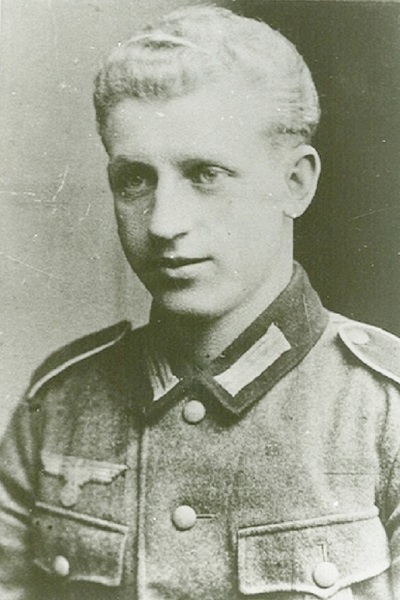Dicke, Anton
- Date of birth:
- August 25th, 1911 (Warstein/Westernphalia, Germany)
- Date of death:
- January 26th, 1943 (between Sinjavino and Shlisselburg/Leningrad Oblas, Soviet Union)
- Nationality:
- German
Biography
Do you have more information about this person? Inform us!
- Period:
- Second World War (1939-1945)
- Rank:
- Obergefreiter (Corporal)
- Unit:
- Gruppenführer 5. / Grenadier-Regiment 3 / 21.Infanterie-Division
- Awarded on:
- February 21st, 1943
“Until he collapsed:
The Führer has awarded the Knight’s Cross of the Iron Cross to Obergefreiter Anton Dicke. Born on the 25.08.1911 in Warstein (Westphalia), he smashed a Soviet breakthrough on his own initiative during the heavy defensive battles south of Lake Ladoga. In this battle Dicke sustained critical injuries, later succumbing to his wounds.
The position of his East Prussian Kompanie was located at the Kastenwald. Here the Grenadiers had dug themselves into the various holes in the ground created by the numerous bomb and shell impacts. The Soviet artillery and Katyusha fire rained down a constant storm of steel on the position, and in response the Grenadiers pressed themselves deep into the dreary earth or against the walls made of cut-down trees. Their machine-guns at the ready, they waited for the Soviets.
Their defenses had been oriented against the large fields over which the enemy would come. They had been trying for days to push back the weak lines of the Grenadiers, as well as pound them with artillery and crush them with tanks. The outlines of burned-out tank wrecks stood out sharply in the clear light of the near horizon on this cold day, and between these scattered forms lay dark, earth-brown shapes. A hailstorm of destruction had swept over the field.
The Soviets fired mercilessly against the position. The Kastenwald - as the Grenadiers called it - had become a wild mess of splintered wood from the various branches and twigs. The load bearers could only make their way very laboriously as they brought food and ammunition forward and wounded back during the night. The ranks of the Grenadiers grew ever thinner. The officers of the Kompanie had been killed or wounded, a Feldwebel had taken over command. No communication links existed to the rear. The telephone links had been smashed and the radio devices riddled with splinters.
But the Soviets continued to drum, hammer and attack. The enemy masses ruthlessly pushed forward in the defensive fire, and enemy tanks rolled forward in continual new waves until they achieved a breakthrough. The weak connection to the left neighbour was broken. Tanks rolled into this area, and Soviet infantry followed up after them under the cover of the dark night. The Zugführers were heavily wounded during close combat with blank weapons, and had to be carried out of the firing line.
Thus Obergefreiter Dicke took over command of the Grenadiers. He stormed forwards with them and won back the old position in a bitter man-to-man fight. No-one had given him orders, and no-one had assigned him the responsibility. He only obeyed the orders from within, and thereby inspired the Grenadiers to offer their greatest resistance. Tired and exhausted, with bleary-eyed faces that had become thin and grey under the edge of their Stahlhelms, they threw themselves against the Red Army onslaught. A handful of soldiers, cut off from all support, defended themselves with bitter determination against the much superior enemy. Anton Dicke, the young squad leader from Warstein (Westphalia), was the soul of the battle. In this solemn hour, as the Soviets repeatedly assailed the position, the Obergefreiter went above and beyond the call of duty and became a superior leader of his Grenadiers. Fighting at their head he became wounded again, this time critically. Not heeding his severe wounds, he continued to lead the defense until he collapsed.
The Soviet breakthrough was defeated.”
- Period:
- Second World War (1939-1945)
- Period:
- Second World War (1939-1945)
Sources
- Photo 1: Igor Poul
- - FELLGIEBEL, W.P., Elite of theThird Reich, Helion & Company Limited, Solihull, 2003.
- HUß, JüRGEN & SONDERMANN, HEINZ-WERNER, Ritterkreuzträger im Mannschaftsstand 1941-1945, VDM Heinz Nickel, Zweibrücken, 2009.
- THOMAS, FRANZ & WEGMANN, GüNTER, Die Ritterkreuzträger der Deutschen Wehrmacht 1939-1945, Biblio Verlag, Osnabrück, 1998.
- Ritterkreuz Archiv IV/2010, Veit Scherzer, Ranis, September 2010, ISSN 1866-4709





